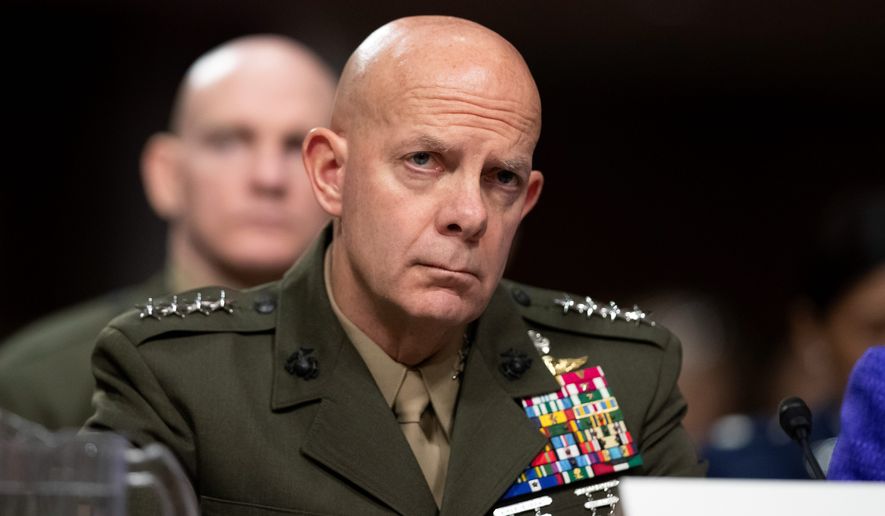Marine Force Design Has Been Debated
The service is taking a big risk but not without much discussion.

Writing in the WSJ, Jim Webb, a Marine war hero in Vietnam who later served as Ronald Reagan’s first Navy Secretary and later still as a Democratic Senator from Virginia and critic of the Iraq War, argues that “Momentous Changes in the U.S. Marine Corps’ Force Organization Deserve Debate.”
Deference to senior command is a hard-wired tradition in elite military organizations, and nowhere is that tradition more honored than in the U.S. Marine Corps. But what happens if a policy coming from the top of the chain of command is insufficiently tested or intrinsically flawed? Where is it written that a subordinate or former commander can set aside deference and demand a second look?
For more than two years many of the Marine Corps’ finest former leaders have struggled with this dilemma as they quietly discussed a series of fundamental changes ordered, and in some cases already implemented, by Gen. David Berger, the current commandant. Among Marines there are serious questions about the wisdom and long-term risk of dramatic reductions in force structure, weapon systems and manpower levels in units that would take steady casualties in most combat scenarios. And it is unclear to just about everyone with experience in military planning what formal review and coordination was required before Gen. Berger unilaterally announced a policy that would alter so many time-honored contributions of the Marine Corps.
After detailing the highlights of the policy, Webb continues,
After several unsuccessful attempts by retired senior officers to engage in a quiet dialogue with Gen. Berger, the gloves have now come off. The traditional deference has been replaced by a sense of duty to the Marine Corps and its vital role in our national security. Recently, 22 retired four-star Marine generals signed a nonpublic letter of concern to Gen. Berger, and many others have stated their support of the letter. A daily working group that includes 17 retired generals has been formed to communicate concerns to national leaders. One highly respected retired three-star general estimated to me that “the proportion of retired general officers who are gravely concerned about the direction of the Corps in the last two and a half years would be above 90 percent.”
There is not much time to stop the potential damage to our national security. Questions should be raised. The law does not give the commandant of the Marine Corps carte blanche to make significant changes in force structure. Title 10 provides that the commandant perform his duties “subject to the authority, direction, and control of the Secretary of the Navy,” and that the Navy secretary “has the authority necessary to conduct all affairs of the Department of the Navy including. . . . organizing,” but “subject to the authority, direction, and control of the Secretary of Defense.” And the president retains ultimate authority as commander in chief.
The risk involved in a restructuring of this scale should have required full consideration and debate in such Pentagon offices as the Defense Resources Board, then a formal approval by the defense secretary before being sent to the White House for further review, and then extensive oversight hearings in Congress.
I share some of Webb’s concerns about the radical force design shifts that began under the previous service chief, Robert Neller, and accelerated pursuant to Berger’s incoming Commandant’s Planning Guidance. But the notion they weren’t and haven’t been debated is laughable.
Indeed, Webb himself participated in the debate, including with a widely-discussed May 2020 op-ed in The National Interest. While he was given the respectful listen that he has earned, Berger himself pushed back thoughtfully, as did his Navy counterpart, Admiral Michael Gilday, and top-notch defense analysts including retired Marine Colonel and Obama Deputy Secretary of Defense Bob Work.
While building the Corps around the so-called “pacing threat,” a future fight with China, takes away capabilities that would be very helpful in a more-likely asymmetric fight, it’s in line with the national security strategies of three successive Presidents going back to the Obama administrations 2011 “pivot to Asia.” And Webb, who has much more intimate knowledge of DOD budget processes than me, knows damned well that Berger didn’t make these changes unilaterally: they were absolutely signed off on by the Secretary of the Navy, Secretary of Defense, and the United States Congress. (The Defense Resources Board ceased to exist in 2005; it’s now the Senior Level Review Group, which reports to the Deputy Secretary of Defense. I can’t imagine it didn’t buy off on these changes.)
While I’m often critical of Congressional fecklessness, including a reluctance to provide adequate oversight of our wars lest they face political blowback and the sheer wastefulness of operating on continuing resolution after continuing resolution, I know for a fact that the appropriate authorization and appropriations committees have pressed Berger very hard on these changes and signed off on them. I had an opportunity to take a group of students to the Hill earlier this month and got an excellent briefing on the process. Berger took a very big and unusual risk in telling Members that, to demonstrate good stewardship on public money, he would pay for the force modernization he required by steep cuts in legacy programs and painful cuts in personnel, including in his own Infantry community. This was a multi-year process that could well have backfired in his getting the cuts and not the replacement appropriations. Instead, he achieved buy-in.
Again, this is all a big risk. Berger has, for example, divested the Corps of every single tank, forcing reliance on the Army for that capability in a big joint fight that may never come. As a former boss, who came up as a tanker, noted at the time: When you need a tank, only a tank will do. Berger may well have placed his bets on the wrong horse. But one thing is for sure: he has thought it through after more than two years of debate. He’s certainly listened to the retired generals. He just thinks they’re wrong.




In all areas, not just the military, modernization is necessary when technology or circumstances shift significantly. It’s inherently risky and the reason why so many organizations stagnate rather than get into emerging areas or technologies. The people that are attracted to being leaders in a best in class powerhouse with a slew of well defined processes are usually not the right people to recognize that dramatic change is needed or want to be part of an organization that is going to be making mistakes and backtracking, which is an inevitability when shifting to new ways of doing things and new areas.
It sounds like Berger is leading such an effort. It can go wrong in two ways: it can be unnecessary and cause the organization to lose ground in the process, or it can be the wrong types of changes. But once leadership is convinced of the need for change and gotten sufficient input on goals and methods, it’s their duty to bring it about.
@MarkedMan: Yes, absolutely right. Even more so than the other services, retired generals continue to carry weight with their successors. They’re an informal sounding board that gets taken seriously. But even genuine experts like Webb will naturally not realize things like the Defense Resources Board having gone away seventeen years ago. Things change and it’s next to impossible to keep up from outside.
We need to pay a lot of attention to the war in Ukraine. What weapons and tactics are the most impactful? Close observation of this actual conflict should provide a lot of answers.
My immediate reaction has been he’s working on Congress and the rest of the defense community to accept the idea, “Don’t send the Marines to do the Army’s job.” OTOH, given that drones and current-gen missiles should be as effective against landing craft as they are proving to be against tanks and helicopters, it does raise the question of just what the Marines’ job will be.
@Michael Cain:
Those who aren’t killed by drones etc in landing craft, will be at risk of dying in a crashing Osprey.
My layman’s take from observing Ukraine and other things is that a military force that seeks to dominate its local space will have to integrate airspace with ground space. And maybe local water/sea space as well. We can expect perhaps our tanks to have a role, but not Russian tanks or other vehicles. They can’t keep up. We can expect handheld weapons and drones to be a growing issue, but there are countermeasures, and those countermeasures belong in the hands of front-line infantry, so they can operate in the integrated way that the USMC has done for a long time. This appears to be what Berger is doing, and I’m nodding.
Getting rid of all the tanks in the USMC, though, is a bit breathtaking.
@Jay L Gischer:
Spent part of the afternoon during the basketball game reading bits by people on both sides of the tank argument. Those in favor of dumping the tanks keep talking about island hopping across the South China Sea. Those in favor of keeping tanks, urban combat in coastal Asian cities or toe-to-toe against Russia in the Baltics. Both assume a conventional war against a large nuclear power. I wonder if Ukraine is going to force some changes in that kind of thinking.
@Michael Cain: In the island-hopping discussion, the Marines found the M-4 Sherman very useful early in the war. In later fights like Iwo Jima and Okinawa the terrain made armor vulnerable. Would be interesting to see what the Marines see when they think about taking back the Pacific from the PLA.